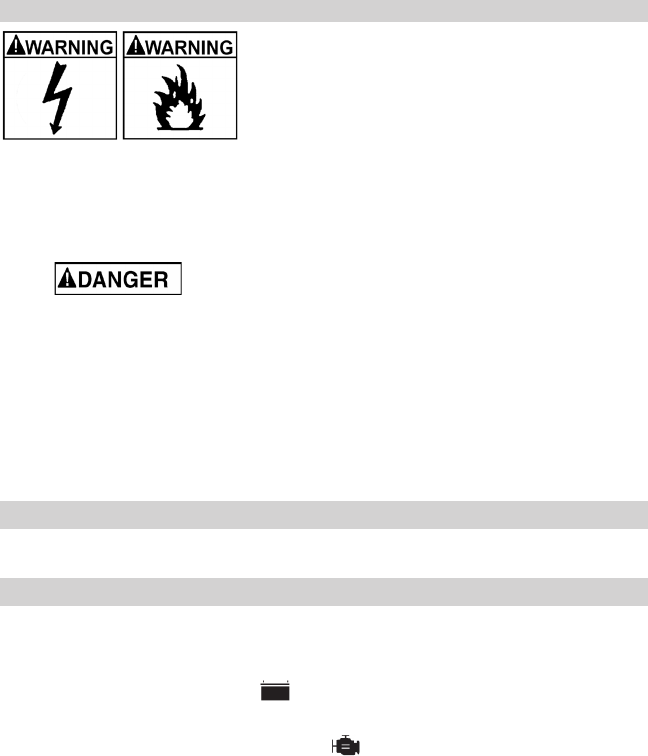
• 39 •
GROUNDING AND AC POWER CORD CONNECTIONS8.
RISK OF ELECTRIC SHOCK OR FIRE.
This battery charger is for use on either a nominal 120V, 50/60 Hz or a nominal 8.1
230V, 50/60 Hz circuit. (See the warning label on the charger for the correct
input voltage.) The charger must be grounded to reduce the risk of electric
shock. The plug must be plugged into an outlet that is properly installed and
grounded in accordance with all local codes and ordinances. The plug pins
must t the receptacle (outlet). Do not use with an ungrounded system.
8.2 Never alter the AC cord or plug provided – if it does not t
the outlet, have a proper grounded outlet installed by a qualied electrician. An
improper connection can result in a risk of an electric shock or electrocution.
If the AC cord is damaged, it must be replaced by the manufacturer, its service 8.3
agent or other qualied person in order to avoid a risk of personal injury or
property damage.
Recommended minimum AWG size for extension cord:8.4
100 feet long or less - use an 18 gauge extension cord.•
Over 100 feet long - use a 16 gauge extension cord.•
ASSEMBLY INSTRUCTIONS9.
Remove all cord wraps and uncoil the cables prior to using the battery charger.
CONTROL PANEL10.
NOTE: Not all switches and LEDs are available on all models.
Ammeter (A)
The Ammeter indicates the amount of current, measured in amps, that is
being drawn by the battery . As a battery takes on a charge, it draws less
current from the charger. Correspondingly, the meter will show less current
being drawn by the battery. When the current stops decreasing, the battery is
charged. The start area of the meter indicates a high rate of current being
drawn from the charger. When cranking an engine, the meter needle will be at
the extreme right side of the start area. The 2 amp charge rate may indicate
some activity on the meter, although the meter does not have the resolution to
display this low rate.
PercentofCharge•
The percent of charge scale is intended as a visual aid to help simplify
reading the state of charge. It is scaled for use with the 6, 10 or 12 amp
charge rate only. The percent of charge is based on the current drawn by
the battery. For this reason, accuracy will vary with the size and battery type.
Typically a 28 ampere hour gel cell battery will draw less current at the end of
the charge cycle than a 140 ampere hour wet cell battery. This means that the
indication for a fully charged large battery may be slightly less than 100%.


















